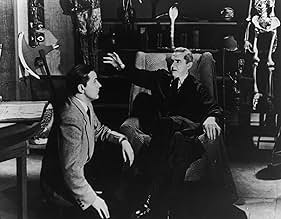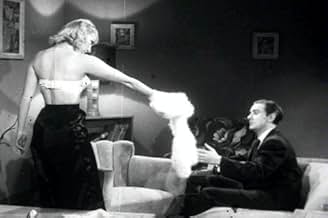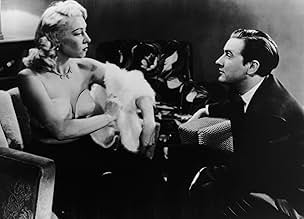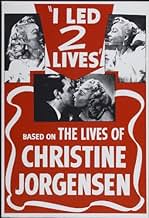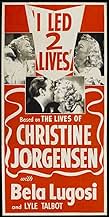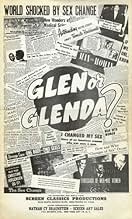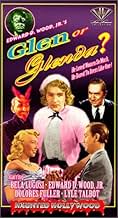VALUTAZIONE IMDb
4,3/10
9502
LA TUA VALUTAZIONE
Aggiungi una trama nella tua linguaA psychiatrist tells the stories of a transvestite (Glen or Glenda) and a pseudohermaphrodite (Alan or Anne).A psychiatrist tells the stories of a transvestite (Glen or Glenda) and a pseudohermaphrodite (Alan or Anne).A psychiatrist tells the stories of a transvestite (Glen or Glenda) and a pseudohermaphrodite (Alan or Anne).
Edward D. Wood Jr.
- Glen
- (as Daniel Davis)
- …
Charlie Crafts
- Johnny
- (as Charles Crafts)
Conrad Brooks
- Banker
- (as Connie Brooks)
- …
Henry Bederski
- Man with Hat and Receding Hairline
- (non citato nei titoli originali)
Carol Daugherty
- Woman in Nightmare
- (non citato nei titoli originali)
Captain DeZita
- The Devil
- (non citato nei titoli originali)
- …
Bruce Spencer
- Homosexual
- (non citato nei titoli originali)
Shirley Speril
- Miss Stevens
- (non citato nei titoli originali)
Amzie Strickland
- Minor Role
- (non citato nei titoli originali)
Harry Thomas
- Man in Nightmare
- (non citato nei titoli originali)
William C. Thompson
- Judge
- (non citato nei titoli originali)
Mr. Walter
- Patrick
- (non citato nei titoli originali)
- …
Recensioni in evidenza
Surprisingly, the movie's neither good nor bad-- it just doesn't register on the conventional spectrum. Instead it's just plain weird, terminally weird. It's like a highschool hygiene lecture wrapped in soft porno, all tossed into a surrealist dream. Really, Wood had all the guts in the world to lecture a 1950's audience on the subtleties of gender bending. That part is genuinely informative and worth a salute. I also liked the soft porn with the squirming girls in semi-undress. But I'm still wondering how that got released in 1953. Then there's Lugosi sitting in some corner of the surrealist universe, telling us to "Bevare of puppy dog tails
" and other hammy nonsense. I figure he was added for marquee value since the rest of the cast are a bunch of unknowns. But what's this thing Wood has for lightning bolts. It's like he says, "Stop the action, it's time for a lightning bolt", and makes just about that much sense. One thing for sure—you never know what's coming next. It might be a stampede of buffalo or a stroll down Ventura Blvd. in drag. And, my gosh, Wood (Glen and Glenda) looks so normal, you'd never guess he makes Salvador Dali seem absolutely conventional. I don't know what part of planet Wacko Wood hails from, but I do know it's no part of the known universe. Nonetheless, here's a fuzzy angora Oscar to Wood for just plain weirdness.
Edward D. Wood Jr., a filmmaker renowned for his lack of finesse or panache, nonetheless created films that have a compulsive watchability about them. Here, he indulges in a heartfelt plea for acceptance as he explores the male fetish of dressing in women's clothing. A psychiatrist (Timothy Farrell) relates to a police inspector (Lyle Talbot) two stories, the primary one being that of Glen (Wood, acting under a pseudonym), who needs to work up the courage to tell his fiancee (Dolores Fuller, Woods' real-life squeeze at the time) that he'd like to wear her outfits. Meanwhile, a demented old scientist (star attraction Bela Lugosi) sits in an Old Dark House, forever uttering things like "Pull ze string!", "Bevare!", and "A new life has begun!"
I'll give Wood some credit here: for whatever slickness he did not possess, he makes this classic B as artful as he can make it. Granted, it fades a little in the stretch, with a bit too much padding, but "Glen or Glenda" is overall an interesting oddity, an appealing mix of the sincere and the sordid. It attempts to shine light on males with different inclinations (including a kid who is referred to as a "pseudohermaphrodite") and implores that the viewer not judge these characters until they hear their whole stories. And they do have back stories that offer some insight into why they grew up the way they did.
Going in, most people know to expect less-than-stellar acting in a Wood epic, although the cast, up to and including Wood himself, do earn points for earnestness. Lugosi is just a total hoot, and seems to delight in some of these quotes that he utters. He has one great moment early on during use of split screen where he comments on denizens of an unnamed city and their lives.
There is nothing quite like an Ed Wood film; while they may not be considered "good" by most peoples' standards, they have an unmistakable, quirky charm.
Five out of 10.
I'll give Wood some credit here: for whatever slickness he did not possess, he makes this classic B as artful as he can make it. Granted, it fades a little in the stretch, with a bit too much padding, but "Glen or Glenda" is overall an interesting oddity, an appealing mix of the sincere and the sordid. It attempts to shine light on males with different inclinations (including a kid who is referred to as a "pseudohermaphrodite") and implores that the viewer not judge these characters until they hear their whole stories. And they do have back stories that offer some insight into why they grew up the way they did.
Going in, most people know to expect less-than-stellar acting in a Wood epic, although the cast, up to and including Wood himself, do earn points for earnestness. Lugosi is just a total hoot, and seems to delight in some of these quotes that he utters. He has one great moment early on during use of split screen where he comments on denizens of an unnamed city and their lives.
There is nothing quite like an Ed Wood film; while they may not be considered "good" by most peoples' standards, they have an unmistakable, quirky charm.
Five out of 10.
I had a particularly masochistic day today, watching both Manos: The Hands of Fate and Glen or Glenda, both of which have at some point been claimed to be the Worst Movie Ever. Watching both movies in one day made Glen or Glenda look good by comparison, but it is, by itself, one of the most bewildering movies I've seen.
I say this not because of its pleas for tolerance in gender matters. That might have seemed odder in the '50s, when homophobia was more mainstream. We've since moved on to debating whether gays can marry. What's really striking about this movie, rather, is the extended surreal dream sequences and the inexplicable narration of Bela Lugosi. Throw Satan in there! Why not? A herd of buffalo stampeding below Lugosi? Why not? Being trampled by the herd would symbolize being run over by society for an urge to cross-dress, wouldn't it? Symbolism! Except the symbolism goes on way too long, one sensing in an effort by Ed Wood to drag his movie over the 60-minute mark. Eventually, it becomes incomprehensible.
And what of that narration? Bela Lugosi, "the Scientist," is kind of like a half-scientist, half-god character, who's also dark. He has skeletons around him for some reason. He says sinister things. Who or what is he? At the same time, a doctor is telling a police officer about Glen and Glenda. I'm reminded of the Nostalgia Critic's criticism of Rock-A-Doodle- who in god's name is telling the story? "The Scientist" or the doctor?
You can find some elements of this style in a movie like Ingmar Bergman's Persona- random flashing of unpleasant things, apparent dream sequences, a kind of god-like "narration" (a boy watching a TV), but that movie was competently done. Glen or Glenda becomes a giant non sequitur- not the worst movie ever, but worth quite the WTF?
I say this not because of its pleas for tolerance in gender matters. That might have seemed odder in the '50s, when homophobia was more mainstream. We've since moved on to debating whether gays can marry. What's really striking about this movie, rather, is the extended surreal dream sequences and the inexplicable narration of Bela Lugosi. Throw Satan in there! Why not? A herd of buffalo stampeding below Lugosi? Why not? Being trampled by the herd would symbolize being run over by society for an urge to cross-dress, wouldn't it? Symbolism! Except the symbolism goes on way too long, one sensing in an effort by Ed Wood to drag his movie over the 60-minute mark. Eventually, it becomes incomprehensible.
And what of that narration? Bela Lugosi, "the Scientist," is kind of like a half-scientist, half-god character, who's also dark. He has skeletons around him for some reason. He says sinister things. Who or what is he? At the same time, a doctor is telling a police officer about Glen and Glenda. I'm reminded of the Nostalgia Critic's criticism of Rock-A-Doodle- who in god's name is telling the story? "The Scientist" or the doctor?
You can find some elements of this style in a movie like Ingmar Bergman's Persona- random flashing of unpleasant things, apparent dream sequences, a kind of god-like "narration" (a boy watching a TV), but that movie was competently done. Glen or Glenda becomes a giant non sequitur- not the worst movie ever, but worth quite the WTF?
Those who have seen Tim Burton's fine tribute film, ED WOOD, know the story behind this; an inexperienced filmmaker named Edward D. Wood, Jr. talked an exploitation movie producer into hiring him to direct what was initially meant to be the story of Christine Jorgenson, the first (and heavily publicized) case of surgically induced transexualism; this project was alternately to be called "The Christine Jorgenson Story," and later (after Jorgenson changed her mind), "I Changed My Sex." Of course, after Ed Wood got his hands on the basic storyline, he altered it so as to tell the story of his own transvestitism and to plead for greater tolerance and understanding; set against the staid morals of the early 1950s, Ed's pleading was actually ahead of its time.
Now, in wanting to tell this story, but in being constrained by both a shoestring budget and some rather bizarrely unusual filmaking instincts, Ed's efforts went sharply astray. This is, without question, one of the loopiest productions ever put on celluloid, chock full of nonsensical dialogue, amateurishly wooden acting (in fact, Ed's hammy attempt at acting was something out of a 1930s B movie), illogically inserted stock footage (gotta love the stampeding buffalo), and various leaps of logic and good taste. In spite, or perhaps because, of these elements, GLEN OR GLENDA is a thoroughly entertaining and endearing piece of high weirdness. The first time you see it, you won't believe what you are seeing.
Long live the Ed Wood cult! Pull the strings!
Now, in wanting to tell this story, but in being constrained by both a shoestring budget and some rather bizarrely unusual filmaking instincts, Ed's efforts went sharply astray. This is, without question, one of the loopiest productions ever put on celluloid, chock full of nonsensical dialogue, amateurishly wooden acting (in fact, Ed's hammy attempt at acting was something out of a 1930s B movie), illogically inserted stock footage (gotta love the stampeding buffalo), and various leaps of logic and good taste. In spite, or perhaps because, of these elements, GLEN OR GLENDA is a thoroughly entertaining and endearing piece of high weirdness. The first time you see it, you won't believe what you are seeing.
Long live the Ed Wood cult! Pull the strings!
As probably many other viewers I decided to see "Glen or Glenda" to verify if it's really what was hinted in the brilliant biographical "Ed Wood". And indeed, I stared with my mouth open at Bela Lugosi's recitations and the random buffalo scene. It was all there. Some honestly unintended avant-garde.
Yet the movie is not half as bad as the legend holds it. The important fact is that it isn't an actual story, it's more of a semi-documentary, party educational picture. Behind the really weird editing the movie tells a lot about transvestitism, transsexualism, relationships, sexual identity and social roles. It's hard to believe that it was made in early 1950s! Not only it was produced significantly before the so called "sexual revolution" of the '60s, but also certain gender issues that were carefully covered in the movie seem to be still beyond the understanding of certain narrow-minded and prejudiced people today.
I recommend this movie to anyone who wants to get to know Edward Wood and his work and also to people interested in the history of approach to gender studies and the society.
Yet the movie is not half as bad as the legend holds it. The important fact is that it isn't an actual story, it's more of a semi-documentary, party educational picture. Behind the really weird editing the movie tells a lot about transvestitism, transsexualism, relationships, sexual identity and social roles. It's hard to believe that it was made in early 1950s! Not only it was produced significantly before the so called "sexual revolution" of the '60s, but also certain gender issues that were carefully covered in the movie seem to be still beyond the understanding of certain narrow-minded and prejudiced people today.
I recommend this movie to anyone who wants to get to know Edward Wood and his work and also to people interested in the history of approach to gender studies and the society.
Lo sapevi?
- QuizSurrealist filmmaker David Lynch called this one of his favorite films. He used the "howling wind" sound effect in Eraserhead - La mente che cancella (1977).
- BlooperThe text accompanying the close-up of a newspaper story headlined "Man Nabbed Dressed As Girl" is a hodge-podge of unrelated paragraphs lifted from stories about tax reform, a prison injury, and faith healing.
- Citazioni
Narrator: Give this man satin undies, a dress, a sweater and a skirt, or even the lounging outfit he has on, and he's the happiest individual in the world. He can work better, think better, he can play better, and he can be more of a credit to his community and his government because he is happy.
- Curiosità sui creditiCard at beginning: In the making of this film, which deals with a strange and curious subject, no punches have been pulled-- no easy way out has been taken. Many of the smaller parts are portrayed by persons who actually are, in real life, the character they portray on the screen. This is a picture of stark realism-- taking no sides -- but giving you the facts -- ALL the facts -- as they are today... YOU ARE SOCIETY -- JUDGE YE NOT...
- Versioni alternativeAt least one VHS release (Bizarre Video's) ends the film with a fade out at the end of Anne's story, thus amputating the final few minutes of the film, so we never learn how Glen's story was resolved.
- ConnessioniEdited into Sleazemania Strikes Back (1985)
I più visti
Accedi per valutare e creare un elenco di titoli salvati per ottenere consigli personalizzati
Dettagli
Botteghino
- Budget
- 20.000 USD (previsto)
- Lordo Stati Uniti e Canada
- 10.158 USD
- Lordo in tutto il mondo
- 10.158 USD
- Tempo di esecuzione1 ora 5 minuti
- Colore
- Mix di suoni
- Proporzioni
- 1.37 : 1
Contribuisci a questa pagina
Suggerisci una modifica o aggiungi i contenuti mancanti

Divario superiore
By what name was Glen or Glenda (1953) officially released in India in English?
Rispondi

